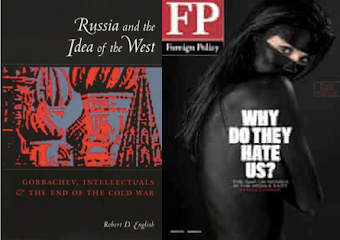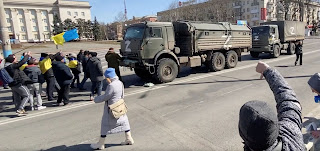Saturday, March 26, 2022
Well, it certainly has been a messy, destructive March. All month long, observers have been watching the war in Ukraine and wondering why Putin has been doing this.
The interesting news this week has been the Kremlin's announcement that the so-called "first phase" of the war is over, and that now Russian forces will be focusing upon Eastern Ukraine.If this is indeed the case, it seems like a noteworthy sign. Could this be Vladimir Putin's "mission accomplished" moment?
It wasn't difficult to predict that this war would go badly for Russia. As I mentioned back in December, invading Ukraine would be a much messier operation that annexing the Crimea had been in 2014.
My sense, however, is that if Russia were to actually invade eastern Ukraine, or the rest of the country more generally, it would not be the smooth, professional-looking mission that we saw in the Crimea. Invading Ukraine would be a much messier, and drawn-out affair, especially if Russia attempted to also occupy the western part of Ukraine, with its much higher proportion of ethnic Ukrainians.
Frankly, I was largely convinced back then that Putin's war talk was largely theater, intended to divide public opinion in the US and Europe and weaken NATO. I was surprised by the ferocity of the initial Russian attack, and its scale, mainly because I'd always considered Putin to be a calculating type of person who'd be too savvy to blunder into a quagmire like this.
But there are reasons to go to war, anyway, I suppose. If you've been making threats for years and are afraid of losing credibility. Or else, perhaps, the people around you have a vested interest in war. Or maybe you simply have been in power for almost 23 years and have begun to consider yourself invincible (aka the Keith Hernandez theory).
Nor is this war, in my opinion, about the sort of grand theories of empire that we learned about in graduate school. Too often, I think, western analysts see Russia through the prism of "ideas." [When it comes to the Middle East, meanwhile, the prism is usually one of feelings and emotions]. In both cases, I think it's better to try to better understand why doing something would benefit someone in practical terms. Russians don't always act simply according to their "ideas," and Middle Easterners do not just act out their hurt feelings. Everyone has practical reasons for doing what they do, most of the time.
 |
| Does anyone remember Kazakhstan? |
The goal surrounding the invasion of Ukraine, as I've generally thought, has been to frighten the US and NATO to the bargaining table by putting a gun to the head of an innocent bystander. Meanwhile, the action also serves notice to other former Soviet republics, such as Armenia, Azerbaijan, or Kyrgyzstan, to avoid making overtures to the West of the sort that Kyiv had been undertaking in recent years. After all, for how many years can the secular-nationalist-authoritarian model hold up in the post-Soviet world?
So, rattle Kyiv's cage, the thinking went. And in the meantime, make them pay. And instead, Russian forces have found themselves whacking at a hornets' nest.
It's hardly a surprise that Russia has gotten bogged down in the fighting. Ukraine's a big country, and home field advantage counts in things like this. The US had a superior military to that of Iraq in 2003, but still couldn't withstand resistance to the occupation. The only thing that was surprising in the case of Russia-Ukraine is that Moscow didn't even get to the occupation phase before things started going wrong.
Anything can happen, of course, and perhaps Moscow's announcement that it will regroup in the east is just a diplomatic feint--it could all just be BS.
But if it's true, I think it's a sign of blood in the water for Putin. Already, it seems like the recent bombardment of cities to the west like Lviv was primarily designed to send a message, as opposed to actually signaling the start of an invasion of the western side of the country. Occupying all of Ukraine was never a realistic possibility.
So what does that leave for Russia? Possibly a face-saving effort designed to maximize "victory" in this alleged non-war, comprising of:
a) Luhansk and Donetsk. Two poor, post-industrial regions that would, frankly, be more useful to Moscow as unstable parts of Ukraine.
b) A land border between Russia and the Crimea.
c) Control over the dam in southern Ukraine that Kyiv has been using to cut off water to the Crimea since the annexation.
And what else has the war accomplished? Punishment. And that, maybe, has been the main goal all along: punish the shit out of Ukraine and Ukrainians, devastate the country, kill large numbers of civilians, and destabilize the country for years, possibly decades, to come. Teach them and others watching what happens when Russia's neighbors venture too closely toward the West.
But wars fought for such feckless reasons have a history of rebounding back upon the countries that start them. Somehow, the same person who managed to annex the Crimea without firing a shot has convinced himself--or been convinced by others--that a bloody, destructive conflict on his southern border made sense.
Time will tell with regard to what happens, of course. Who knows? Maybe we'll spend the next five years watching the Russian Army bleed out in Ukraine. Or perhaps Russia will declare victory in its "first stage" of the non-war and retreat to more defensible territory in the east.
Either way, without doubt, there are still tough times ahead for people in both Ukraine and Russia.
Also see:
More Thoughts Re Ukraine and NATO
Looking for the Long-Term in Putin's Moves
Moscow Recognizes Two Breakaway Republics: Why do this?
The Monroe Doctrine, Putin, and Post-Soviet Space: Don't Muddy the Waters
***
Are you a Turk across empires? Order a copy today, then get another one for your library.
More commentary, photos, and links can be found in the Borderlands Lounge.






No comments:
Post a Comment